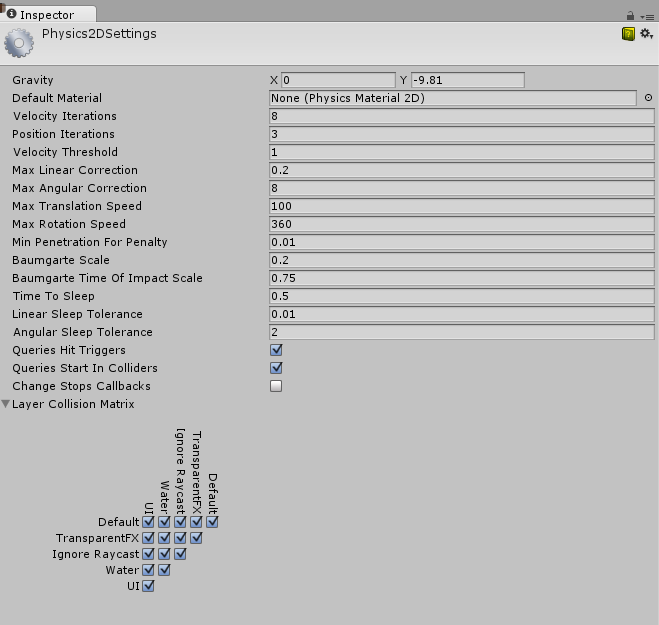Physics 2D Manager
The Physics Manager lets you provide global settings for 2D physics (menu: Edit > Project Settings > Physics 2D). There is also a corresponding manager for 3D physics, described here.

Properties
| Property: | Function: |
|---|---|
| Gravity | The amount of gravity applied to all Rigidbody2D objects. Generally, gravity is only set for the negative direction of the Y-axis. |
| Default Material | The default Physics Material 2D that will be used if none has been assigned to an individual collider. |
| Velocity Iterations | The number of iterations made by the physics engine to resolve velocity effects. Higher numbers result in more accurate physics but at the cost of CPU time. |
| Position Iterations | The number of iterations made by the physics engine to resolve position changes. Higher numbers result in more accurate physics but at the cost of CPU time. |
| Velocity Threshold | Collisions with a relative velocity lower than this value will be treated as inelastic collisions (ie, the colliding objects will not bounce off each other). |
| Max Linear Correction | The maximum linear position correction used when solving constraints (range, 0.0001 to 1000000). This helps to prevent overshoot. |
| Max Angular Correction | The maximum angular correction used when solving constraints (range, 0.0001 to 1000000). This helps to prevent overshoot. |
| Max Translation Speed | The maximum linear speed of a rigidbody object during any physics update. |
| Max Rotation Speed | The maximum linear speed of a rigidbody object during any physics update. |
| Min Penetration For Penalty | The minimum contact penetration radius allowed before any separation impulse force is applied. |
| Baumgarte Scale | Scale factor that determines how fast collision overlaps are resolved. |
| Baumgarte Time of Impact Scale | Scale factor that determines how fast time-of-impact overlaps are resolved. |
| Time to Sleep | The time (in seconds) that must pass after a rigidbody stops moving before it goes to sleep. |
| Linear Sleep Tolerance | The linear speed below which a rigidbody will go to sleep after the “time to sleep” elapses. |
| Angular Sleep Tolerance | The rotational speed below which a rigidbody will go to sleep after the “time to sleep” elapses. |
| Queries Hit Triggers | Should any physics queries (Linecasts, Raycasts, etc) that intersect with a Collider marked as a Trigger return a hit? Check the box for yes, leave it unchecked for these queries to not return a hit. |
| Queries Start In Colliders | Will any physics queries (Linecasts, Raycasts, etc) that start inside a collider detect the collider they start in? Check the box for yes. |
| Change Stops Callbacks | Whether or not to stop reporting collision callbacks immediately if any of the objects involved in the collision are deleted or moved. |
| Layer Collision Matrix | Defines how the layer-based collision detection system will behave. |
Details
The settings of the physics manager define limits on the accuracy of the physical simulation. Generally speaking, a more accurate simulation requires more processing overhead, so these settings offer a way to trade off accuracy against performance. See the Physics section of the manual for further information.